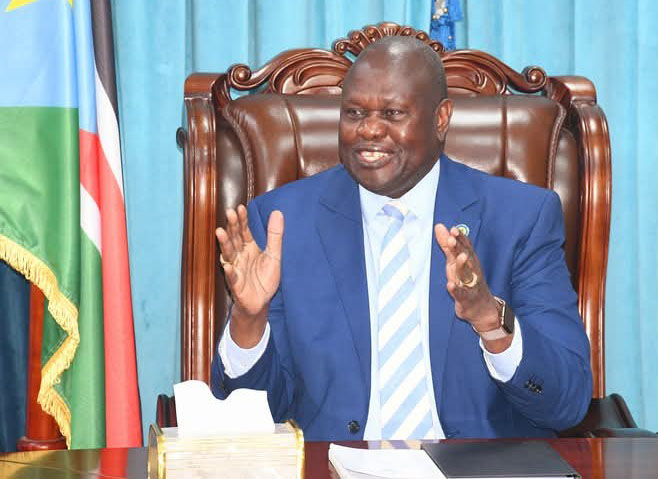By Bosco Bush
First Vice President Dr. Riek Machar Teny called for swift implementation of Revitalized Agreement on the Resolution of Conflict in South Sudan (R-ARCSS) to boost donor confidence and to support the process.
He mentioned this following a meeting with R-JMEC Interim Chairperson, Maj. Gen. Charles Tai Gituai.
The meeting discussed various critical issues on the implementation of the 2018 revitalized peace agreement.
These include public financial management, security arrangements, unification and deployment of forces, national security law, humanitarian situation and population census.
They also discussed the ongoing permanent constitution-making process as key to lasting stability through a peaceful transition and good governance, among other prerequisites as prescribed in the 2018 peace accord.
According to a statement, Dr Machar highlighted numerous challenges facing the processes of the agreement.
He urged all parties to accelerate progress on unimplemented activities to secure continued support from international partners and donors.
He also underlined the importance of conducting a population census, which is one of many prerequisites for the conduct of free, fair, democratic and inclusive elections at the end of the extended period.
On the Tumaini Initiative, the FVP reiterated the government’s commitment to ensure that the holdout groups join the Revitalized Government of National Unity and participate in the ongoing processes.
“We would love to see them participating in the process for inclusive government,” he added.
Briefing the media after the meeting, Amb. Charles Tai Gituai, said they discussed Chapter 2 of the agreement specifically security arrangements per the Revitalized Peace Agreement, among others.
In July, the Revitalized Transitional Government of National Unity reported only 10% of the 2018 peace pact activities have been implemented, with 33% ongoing and 57% pending tasks.
The peace agreement that’s supposed to be implemented within 36 months ending the transitional period with holding of general elections, has faced backdrops with several extensions surpassing its stipulated timeline.
Although relatively calm has returned to the country after signing and implementation of the 2018 revitalized peace agreement, persistent challenges continue across the country; hunger, economic decline, communal violence, killings, armed insurgency, absence of rule of law, and continued displacement in many parts of the country.
Civil servants remain unpaid, and many diplomatic missions have either closed or are on the verge of closing due to lack of financial support for the missions.
Tumaini Initiative
Launched on May 9, 2024, and hosted by the Kenyan government to salvage tranquillity in South Sudan; Tumaini Peace Initiative is a high-level mediation for the conflict in South Sudan by incorporating all the holdout groups that have not signed the 2018 Revitalized Agreement on Resolution of the Conflict in South Sudan [R-ARCISS].
Two months later after the launch, parties struck significant progress – initialing at least 9 Protocols close to marking a final deal.
However, the process faced setbacks caused by SPLM-IO’s withdrawal of its delegates from participation in the talks citing contravention of the Tumaini Protocols to the 2018 R-ARCISS.
Dr. Riek Machar Teny, Chairman of the Sudan People’s Liberation Movement-In Opposition [SPLM-IO] who doubles as the First Vice President, rejected the initialed protocols and declared his party’s withdrawal stating that, the Tumaini Initiative has deviated from its intended purpose which is to complement the R-ARCISS.
This move brought about over four-month hiatus before the relaunch and resumption of the Tumaini talks in November 2024, with an aim to incorporate the holdout opposition groups to join the peace process in order to restore lasting peace and stability in South Sudan.




